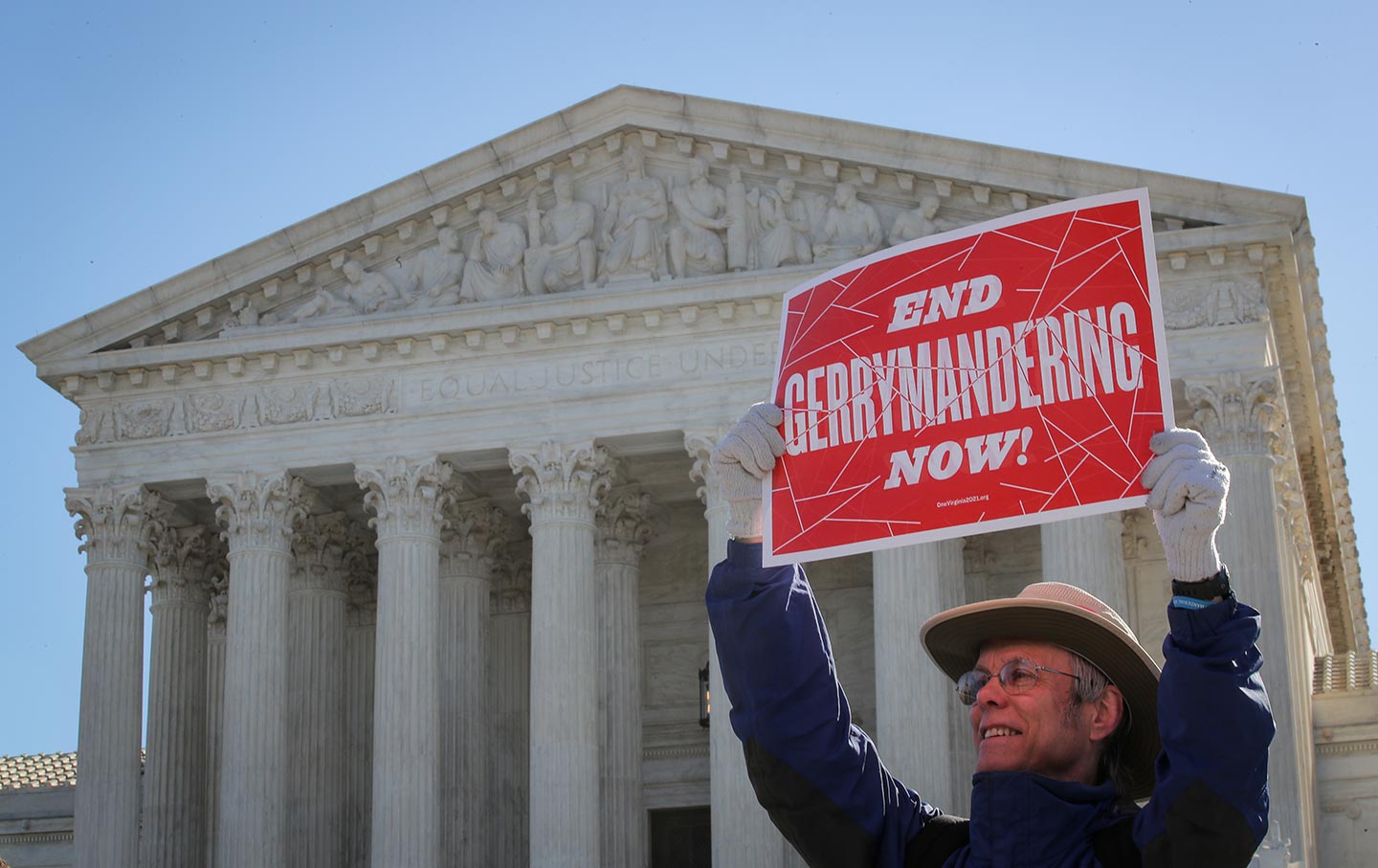It Just Might Be That Democrats Know How to Win Michigan
A pair of special-election landslides proves that the party is doing something right.

Michigan Governor Gretchen Whitmer
(Bill Pugliano / Getty Images)Less than a decade ago, Michigan looked like it was shifting to the right. The historic labor state, home to the United Auto Workers’ headquarters in Detroit and a rich tradition of working-class politics, had a two-term Republican governor, a Republican attorney general, a Republican secretary of state, and solid Republican majorities in both houses of the state legislature. In 2016, after decades of backing Democrats in presidential races, Michigan rejected Hillary Clinton and chose Republican Donald Trump, providing Trump with 16 Electoral College votes that were critical to his victory.
Then the Democrats staged an epic comeback. In 2018, they won the governorship and the races for attorney general and secretary of state. They also passed Proposal 2, a citizen-initiated constitutional amendment that set up an independent redistricting commission tasked with replacing legislative maps that had been gerrymandered to favor the Republicans. In 2020, Democrat Joe Biden beat Trump by a comfortable margin of more than 150,000 votes—a significantly stronger finish than in the other “blue wall” states, Wisconsin and Pennsylvania, that flipped to the Democrats that year. And in 2022, Democrats retained the top three jobs in the state and took control of the state House and state Senate. “We got our clocks cleaned,” admitted state GOP chair Pete Hoekstra.
By 2023, Democrats had enacted measures to defend reproductive rights, restore protections for workers and their unions, and make the Great Lakes State a leader on a host of economic, social, and racial justice issues.
But the experience of being beaten down in the 2010s shook the faith of a lot of political seers. They still saw Michigan as vulnerable to a Republican resurgence. There were skeptics who wondered whether Michigan Democrats could maintain the momentum. Last week, they got their answer, in a pair of special elections that determined that Democrats could maintain the unified grip on the state government that has allowed them to chart such a bold course.
Special elections are always challenging, as they tend to draw fewer voters and give those who do turn out an opportunity to send a message to people in power. And these elections were in suburban Detroit districts where Democratic incumbents, both of whom had been elected to local mayoralties last fall, had stood down—leaving the two parties with a 54-54 tie in the state House. These were districts where, though Democrats had some advantages, a backlash against the party could have left it without control of the legislature. And these particular special elections gave Republicans an opportunity to target all their energy and resources on flipping suburban seats and potentially derailing Whitmer’s agenda.
But that didn’t happen—not by a long shot. Last Tuesday’s contests produced big wins for a pair of pro-choice Democrats, giving the party a 56-54 majority and a clear path to carry forward with a progressive agenda that includes funding free community college for all high school graduates, establishing free preschool for 4-year-olds, and addressing gun violence and school safety.
In a district representing parts of Macomb and Wayne counties, Democrat Mai Xiong, who came to the United States as a 3-year-old Hmong refugee and eventually became a Mccomb County commissioner, won 65 percent of the vote. In a suburban Wayne County district, Peter Herzberg, a City Council member in Westland, won 60 percent of the vote.
What accounted for the landslide victories in contested races that drew major media attention? Xiong and Herzberg both benefited from strong support from Whitmer, and a muscular Democratic Party. They also ran as energetic supporters of reproductive rights, a stance that has benefited Democratic contenders in states across the country since the US Supreme Court’s 2022 decision to overturn Roe v. Wade.
Pundits keep suggesting that the political potency of this issue will fade. But there were no signs of that happening in Michigan, as Democratic Legislative Campaign Committee President Heather Williams noted. “Michigan has been a shining example of what can be accomplished when Democrats are in control—from action on gun violence to expanding healthcare access,” she said. “Voters want their fundamental freedoms protected, and tonight’s elections delivered a clear rebuke of GOP extremism and attacks on reproductive care.”
Defending reproductive rights remains a resonant issue in Michigan and other battleground states, such as Wisconsin, Pennsylvania, Nevada, and Arizona. But that’s not the only advantage Democrats had on Tuesday. Whitmer’s appeal, as a popular and effective governor with a growing list of accomplishments, also helped boost the Democratic numbers. So, too, did strong labor support for the Democrats.
That bodes well for Michigan Democrats in the fall, and for the candidate who will top the party’s ballot line: Joe Biden.
Michigan has been one of the biggest concerns for Democratic strategists as the 2024 election approaches. In the center of that blue wall of Northern industrial states that the party pretty much has to carry in order to hold the presidency, Michigan also has an open US Senate seat and several contests that could be critical to deciding which party controls the US House after November.
All three blue-wall states swung to Republican Donald Trump in 2016 and then voted for Biden in 2020. Unlike in most other “battleground” states, Biden’s 2020 win in Michigan was a healthy one—he beat Trump by a 51-48 margin. That led to speculation that Biden might be able to count Michigan among his “safe” states in 2024. But Michigan was looking vulnerable even before the October 7 Hamas attack on Israel, and the ensuing Israeli attack on Gaza stirred the political pot with speculation that the state’s highly engaged and influential block of Arab American voters, concentrated in cities such as Dearborn, could turn against Biden and deprive him of a statewide win.
That’s still a significant factor in calculations regarding the November contest, as Biden and top Democrats have failed to put sufficient pressure on Israel to accept a cease-fire to stop the killing and avert mass starvation in Gaza. There’s no question that Biden’s stance has hurt him; more than 100,000 Michigan Democratic primary voters cast “uncommitted” ballots in an effort to send a pro-cease-fire message to the president.
Popular
“swipe left below to view more authors”Swipe →Polls generally suggest that the November race in Michigan will be tight, with both candidates struggling to get anywhere near 50 percent. But the Michigan Republican Party is in disarray. Dueling factions attempted to hold separate conventions in early March, the party chair was removed earlier this year amid complaints about “financial instability” and “chaos in our party,” and infighting has grown so intense that pollster Richard Czuba recently described the state GOP as “a dysfunctional dumpster fire,” and argued, “Not one thing occurring right now at the state GOP will help them to elect candidates. Nothing.”
On the other hand, Michigan Democrats keep winning, as Tuesday’s results illustrated. As the DLCC’s Abhi Rahman said Wednesday, “These victories bode well for candidates up and down the ballot in November.”
Joe Biden will be hoping she’s right.
Disobey authoritarians, support The Nation
Over the past year you’ve read Nation writers like Elie Mystal, Kaveh Akbar, John Nichols, Joan Walsh, Bryce Covert, Dave Zirin, Jeet Heer, Michael T. Klare, Katha Pollitt, Amy Littlefield, Gregg Gonsalves, and Sasha Abramsky take on the Trump family’s corruption, set the record straight about Robert F. Kennedy Jr.’s catastrophic Make America Healthy Again movement, survey the fallout and human cost of the DOGE wrecking ball, anticipate the Supreme Court’s dangerous antidemocratic rulings, and amplify successful tactics of resistance on the streets and in Congress.
We publish these stories because when members of our communities are being abducted, household debt is climbing, and AI data centers are causing water and electricity shortages, we have a duty as journalists to do all we can to inform the public.
In 2026, our aim is to do more than ever before—but we need your support to make that happen.
Through December 31, a generous donor will match all donations up to $75,000. That means that your contribution will be doubled, dollar for dollar. If we hit the full match, we’ll be starting 2026 with $150,000 to invest in the stories that impact real people’s lives—the kinds of stories that billionaire-owned, corporate-backed outlets aren’t covering.
With your support, our team will publish major stories that the president and his allies won’t want you to read. We’ll cover the emerging military-tech industrial complex and matters of war, peace, and surveillance, as well as the affordability crisis, hunger, housing, healthcare, the environment, attacks on reproductive rights, and much more. At the same time, we’ll imagine alternatives to Trumpian rule and uplift efforts to create a better world, here and now.
While your gift has twice the impact, I’m asking you to support The Nation with a donation today. You’ll empower the journalists, editors, and fact-checkers best equipped to hold this authoritarian administration to account.
I hope you won’t miss this moment—donate to The Nation today.
Onward,
Katrina vanden Heuvel
Editor and publisher, The Nation
More from The Nation

The King of Deportations The King of Deportations
ICE’s illegal tactics and extreme force put immigrants in danger.

How Rob Reiner Tipped the Balance Against Donald Trump How Rob Reiner Tipped the Balance Against Donald Trump
Trump’s crude disdain for the slain filmmaker was undoubtedly rooted in the fact that Reiner so ably used his talents to help dethrone him in 2020.

The Economy Is Flatlining—and So Is Trump The Economy Is Flatlining—and So Is Trump
The president’s usual tricks are no match for a weakening jobs market and persistent inflation.

Trump’s Vile Rob Reiner Comments Show How Much He Has Debased His Office Trump’s Vile Rob Reiner Comments Show How Much He Has Debased His Office
Every day, Trump is saying and doing things that would get most elementary school children suspended.




